Grant made an amused choking sound. ‘I don’t own any of this; it’s all on loan from my sponsor.’
‘Can I ask who that is?’
‘A pharmaceuticals company.’
‘And what do they get out of it?’
‘That remains to be seen. But there’s no such thing as a useless discovery in molecular biology. At the very least they can always play pass-the-patents, so someone else is left holding them when it finally becomes obvious that they have no commercial value whatsoever.’
They sat on the deck and talked for a while, looking out across the harbour. It was humid, but still quite cool; the fishing boats had all left long ago, and the marina was almost deserted. When Grant asked about his childhood Prabir spoke of the family’s rare trips to Ambon, and tried to create the impression, without actually lying, that they’d travelled all over the region. But when she came right out and asked him what his parents had done, he said they’d been involved in seafood exports.
‘So they made a fortune and retired to Toronto?’
‘No. They both died here.’
‘I’m sorry.’ She quickly changed the subject. ‘Do you have anything you want to ask me? Before you decide to trust me not to run us into the nearest reef?’
Prabir hesitated, wary of offending her. ‘Do you use alcohol much?’
Grant was scandalised. ‘Not at sea! ’
Prabir smiled. ‘No, of course not. How could I forget the long nautical tradition of sobriety?’
‘There is one, actually. Dating back to the Industrial Health and Safety Laws of nineteen … something-or-other.’ She was treating it as a joke, but she did seem slightly wounded. ‘Was I very drunk yesterday?’
Prabir replied diplomatically, ‘You were a lot more lucid than anyone else in the bar.’
Grant stood up abruptly, stretching her shoulders. ‘Well, you have a deal, if you’re still interested. And if you’re willing to do the cooking, you can forget about paying for food.’
‘That sounds fair.’ He rose to his feet beside her.
‘When would you be able to leave?’
‘Whenever you like. I just have to get my things and check out of the hotel.’
‘If you can be back in an hour, we can go this morning.’
‘An hour?’ Prabir was taken aback, but he had no reason to object. ‘OK. I’d better get moving then.’ He raised a hand in farewell and headed for the pier.
Grant called after him, ‘See you soon.’
Replaying parts of their conversation in his head as he walked along the marina, Prabir felt a belated sense of panic. If he’d hitched a ride on a crowded fishing boat, he could have sat in a corner and disappeared amidst the bustle, wrapped in the shield of his imperfect Indonesian. He and Grant could be stuck with each other’s company for weeks, and there’d be no easy way to retreat into silence.
But this was the best opportunity he’d have of reaching Madhusree. And Grant would have far more important things to do than probe his story every waking moment. They’d probably get on well enough, but he could still keep her at arm’s length. He’d worked harmoniously for nearly ten years with people at the bank to whom he’d never said a word about the war, or his parents, or the island. He really had nothing to fear.
Before checking out of the hotel, Prabir sat on his bed and called Felix. It was eight p.m. in Toronto, but he decided to leave a message rather than talking live. He’d promised to keep Felix informed of his plans, but the prospect of exchanging small talk held no attraction for him. They were twenty thousand kilometres apart, he was on his own, and he didn’t want to forget that for a second.
Back at the marina, Grant was in high spirits, eager to depart after being delayed for so long. Prabir threw his backpack under his bunk and watched over her shoulder as she programmed the boat.
Ambon Harbour was as automated as any airport. Grant lodged a request for a southbound route into the Banda Sea, and the Harbour Master’s software fed it to the autopilot. The engines started up, with a sound like water flowing through plumbing, and they began backing out of the dock immediately. There were several large cargo ships moored further along the wharves, but there was no traffic in sight other than the tiny water taxis and a few pleasure craft.
It was ten kilometres to the harbour entrance, and the speed limit made it a leisurely trip. Grant had pointed out the visible parts of the boat’s machinery earlier, but at Prabir’s request she summoned up schematics on the console and had the software deliver its full technospiel.
The boat’s fuel cells doubled as batteries which could be charged either by solar electricity, from the deck and cabin roof, or by pouring in methanol which was split into water and carbon dioxide. A single elaborate polymer contained both catalytic sites which ‘burnt’ the methanol, and embedded vanadium ions which stored and released the energy by toggling between oxidation states. All the chemicals involved were bound firmly in place; the water emerged pure enough to drink.
The engines were polymer too, corrosion-resistant electrodes and superconducting coils that accelerated sea water through any of the six channels that ran through a streamlined hub on the underside of the hull. With no moving parts, the only routine problem the engines could suffer was seaweed fouling the sieve-like filters guarding the channels, and even that was usually cleared automatically with a few pulses of reverse thrust.
Prabir said, ‘This is elegant. This is how a boat should be.’
Grant appeared noncommittal. ‘You don’t long for the romance of sail?’
‘Ha. Did you ever long to spend your time fighting ropes and canvas in the middle of a storm on the North Sea?’
Grant smiled. ‘No, but—’ She gestured at the cloudless blue sky. ‘As a boy, you must have been on prahus all the time.’
He shook his head. ‘Everything was diesel. We never lived in the kind of small villages where people built their own traditional fishing boats.’ He wasn’t even lying, but as soon as he began talking about the past he could feel muscles in his face growing tense from the effort of concealment.
‘Well, MHD certainly outclasses diesel,’ Grant conceded. ‘Though I wouldn’t use the word “elegant” myself. On that score, an eel leaves a boat like this for dead.’ She leant back against the bench beside the console; she was teasing him, but Prabir couldn’t resist the bait.
He said, ‘That’s professional bias talking. An eel isn’t optimised for swimming, just because it’s done no better for the past few million years. It fritters away half its energy on just being alive: every cell in its body needs to be fed, whether or not it’s working. Like the crew you didn’t want to hire. Evolution does a lot of things very nicely: shark skin minimises turbulence, crustacean shells are strong for their weight. But we can always do better by copying those tricks and refining them, single-mindedly. For a living creature, everything like that is just a means to an end. Show me an eel without gonads, and then I’ll concede that nature builds the perfect swimming machine.’
Grant laughed, but she admitted begrudgingly, ‘You’re right, in a sense: it costs us a lot of energy to build each new boat, but it’s still convenient to segregate that from ordinary fuel use. I wouldn’t want to travel in a pregnant ship, let alone one that had to prove itself to prospective mates in a ramming contest. And even marine engineers can get by without children; they just need good designs that will propagate memetically. But none of this is truly divorced from biology, is it? Someone, somewhere has to survive and have offspring, or who inherits the designs, and improves upon them, and builds the next boat?’
Читать дальше


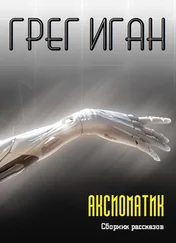

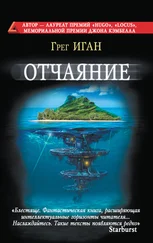
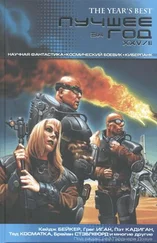
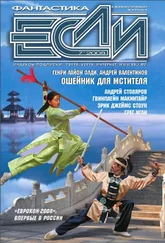

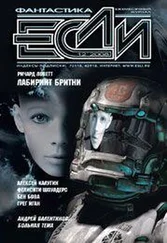
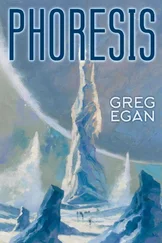
![Грег Иган - Рассказы [компиляция]](/books/419837/greg-igan-rasskazy-kompilyaciya-thumb.webp)
